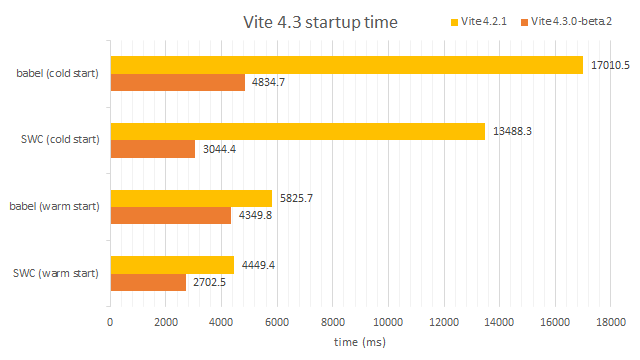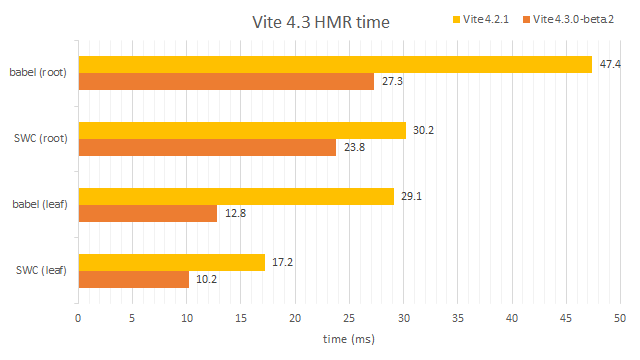How we made Vite 4.3 faaaaster 🚀
Just like @sapphi-red said, Vite 4.3 has made amazing performance improvements over Vite 4.2.


These benchmarks based on a large project with 1000 react components. And these react components were transformed by vite-plugin-react and vite-plugin-react-swc.
As a new rookie on the team, I am so glad that I've joined this party. To let more people know what we did to make Vite 4.3 so fast, we are happy to share the experience.
Smarter resolve strategy
Vite resolves all the received URLs and paths to get the target modules.
In Vite 4.2, there are many redundant resolve logics and unnecessary module searches. Vite 4.3 makes the resolve logic simpler, stricter and more accurate to reduce calculations and fs calls.
A simpler resolve
Vite 4.2 heavily depends on the resolve package to resolve the dependency's package.json, when we looked into the source code of resolve, there was much useless logic while resolving package.json. Vite 4.3 abandons resolve and follows the simpler resolve logic: directly checks whether package.json exists in the nested parents' directories.
A stricter resolve
Vite has to call the Nodejs fs APIs to find the module. But IO is expensive. Vite 4.3 narrows the file search and skips searching some special paths in order to reduce the fs calls as much as possible. e.g:
- Since
#symbol would not appear in URLs and users could control that no#symbol in the source files' paths, Vite 4.3 no longer checks paths with#symbol inside the user's source files but only searches them in thenode_modules. - In Unix systems, Vite 4.2 checks each absolute path inside the root directory first, it's fine for most paths, but it would be very likely to fail if the absolute path starts with the root. To skip searching
/root/root/path-to-filewhile/root/rootdoesn't exist, Vite 4.3 judges whether/root/rootexists as a directory at the beginning and pre-caches the result. - When Vite server receives
@fs/xxxand@vite/xxx, it would be unnecessary to resolve these URLs again. Vite 4.3 directly returns the previously cached result instead of re-resolving them.
A more accurate resolve
Vite 4.2 recursively resolves the module when the file path is a directory, this would lead to unnecessary calculations repeatedly. Vite 4.3 flattens the recursive resolution and applies appropriate resolution to different types of paths. It's also easier to cache some fs calls after flattening.
Package package package
Thanks to @bluwy's nice work, Vite 4.3 breaks the performance bottleneck of resolving node_modules package data.
Vite 4.2 uses absolute file paths as the package data cache keys. That's not enough since Vite has to traverse the same directory both in pkg/foo/bar and pkg/foo/baz.
Vite 4.3 uses not only the absolute paths(/root/node_modules/pkg/foo/bar.js & /root/node_modules/pkg/foo/baz.js) but also the traversed directories(/root/node_modules/pkg/foo & /root/node_modules/pkg) as the keys of pkg cache.
Another case is that Vite 4.2 looks up package.json of a deep import path inside a single function, e.g when Vite 4.2 resolves a file path like a/b/c/d, it first checks whether root a/package.json exists, if not, then finds the nearest package.json in the order a/b/c/package.json -> a/b/package.json, but the fact is that finding root package.json and nearest package.json should be handled separately since they are needed in different resolve contexts. Vite 4.3 splits the root package.json and nearest package.json resolution in two parts so that they won't mix.
fs.realpathSync issue
There was an interesting realpathSync issue in Nodejs, it pointed out that fs.realpathSync is 70x slower than fs.realpathSync.native.
But Vite 4.2 only uses fs.realpathSync.native on non-Windows systems due to its different behavior on Windows. To fix that, Vite 4.3 adds a network drive validation when calling fs.realpathSync.native on Windows.
You can check more details here.
Vite never gives up on Windows 🔥
Non-blocking tasks
As an on-demand service, Vite dev server can be started without all the stuff being ready.
Non-blocking tsconfig parsing
Vite server needs tsconfig data when pre-bundling ts or tsx.
Vite 4.2 waits for tsconfig data to be parsed in the plugin hook configResolved before the server starts up. Page requests could visit the server once the server starts up without tsconfig data ready even though the request might need to wait for the tsconfig parsing later.
Vite 4.3 inits tsconfig parsing before the server starts up, but the server won't wait for it. The parsing process runs in the background. Once a ts-related request comes in, it will have to wait until the tsconfig parsing is finished.
Non-blocking file processing
There are plenty of fs calls in Vite, and some of them are synchronous. These synchronous fs calls may block the main thread. Vite 4.3 changes them to asynchronous. Also, it's easier to parallelize the asynchronous functions. One thing about asynchronous functions you should care about is that there might be many Promise objects to be released after they are resolved. Thanks to the smarter resolve strategy, the cost of releasing fs-Promise objects is much less.
HMR debouncing
Consider two simple dependency chains C <- B <- A & D <- B <- A, when A is edited, HMR will propagate both from A to C and A to D. This leads to A and B being updated twice in Vite 4.2.
Vite 4.3 caches these traversed modules to avoid exploring them multiple times. This could have a big impact on those file structures with components barrel importing. It's also good for HMR triggered by git checkout.
Parallelization
Parallelization is always a good choice for better performance. In Vite 4.3, we parallelized some core features includes imports analysis, extract deps' exports, resolve module urls and run bulk optimizers. There is indeed an impressive improvement after parallelization.
Javascript optimization
Do not miss programming language optimization. Some interesting javascript optimization cases in Vite 4.3:
Substitute *yield with callback
Vite uses tsconfck(by @dominikg) to find and parse tsconfig files. tsconfck used to walk the target directory via *yield, one disadvantage of the generator is that it needs more memory spaces to store its Generator object and there would be plenty of generator context switches in the runtime. So @dominikg substituted *yield with callback in the core since v2.1.1.
Check more details here.
Substitute startsWith & endsWith with ===
We also noticed that Vite 4.2 uses startsWith and endsWith to check the heading and trailing '/' in hot URLs. We compared str.startsWith('x')'s and str[0] === 'x''s execution benchmarks and found === was about ~20% faster than startsWith. And endsWith was about ~60% slower than === in the meantime.
Avoid recreating regular expression
Vite needs a lot of regular expressions to match strings, most of them are static, so it would be much better to only use their singletons. Vite 4.3 hoists regular expressions so they could be reused.
Abandon generating custom error
There are some custom errors for better DX in Vite 4.2. Those errors might lead to extra calculation and garbage collection which would slow down Vite. In Vite 4.3, we have to abandon generating some hot custom errors(e.g package.json NOT_FOUND error) and directly throw the original ones for better performance.
Inch by inch
Rome wasn't built in a day
So was Vite 4.3.
We put a lot of big or small efforts to optimize the performance as much as possible. And finally, we made it!
This article shows the main ideas about how we optimize Vite 4.3. If you are interested in more of what we did, see CHANGELOG here.
Looking forward to sharing with us your Vite 4.3 stories.
Benchmark ecosystem
- vite-benchmark(by @fi3ework): Vite uses this repo to test every commit's benchmark, if you are developing a large project with Vite, we are happy to test your repo for more comprehensive performance.
- vite-plugin-inspect(by @antfu): vite-plugin-inspect supports showing the plugins' hook time since v0.7.20, and there will be more benchmark graphs in the future, let us know what you need.
- vite-plugin-warmup(by @bluwy): warm up your Vite server, and speed up the page loading!